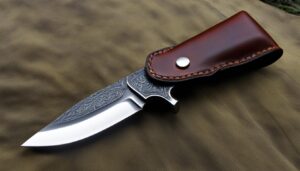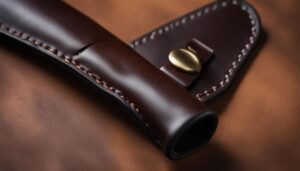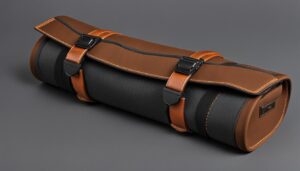Proper care and maintenance are crucial for ensuring the longevity of your hunting knife. One essential aspect of knife care is proper storage. Whether you’re an avid hunter or a beginner, knowing how to store your hunting knives correctly is key to preserving their quality and performance.
When it comes to knife storage, there are a few guidelines you should follow. By adhering to these recommendations, you can protect your hunting knives from damage, corrosion, and other factors that may compromise their functionality. Let’s take a closer look at some knife storage tips.
Key Takeaways:
- Ensure to clean your hunting knife after each use to prevent corrosion caused by minerals transferred from sweaty hands.
- Lubricate the blade regularly with gun oil to reduce friction and protect against corrosion.
- Consult a bladesmith for professional care if your knife requires it.
- Store your hunting knife in a cool, dry place, preferably in a sheath, to prevent moisture buildup and potential damage.
- Consider using acid-free paper and desiccants to further protect your knife from mold and moisture during storage.
The Importance of Using Your Knife for Its Intended Purpose
When it comes to hunting knives, using them for their intended purpose is of utmost importance. Whether you’re skinning game or performing other tasks in the wilderness, using your knife correctly will not only ensure its durability but also enhance its overall performance.
Using a hunting knife for tasks it wasn’t designed for can lead to irreversible damage. For example, using your knife to cut branches or split firewood can result in blade chipping or even breaking. Switchblades, which are primarily designed for quick deployment, should never be used for heavy-duty tasks like splitting wood, as the internal mechanisms may be compromised.
By using your hunting knife for its intended purpose, you can maximize its durability and prolong its lifespan. This means selecting the right knife for each specific task, whether it’s field dressing, quartering, or general utility. By doing so, you’ll not only preserve the integrity of your knife but also ensure your own safety in the field.
“Using a hunting knife for its intended purpose not only ensures its longevity but also enhances its overall performance.”
Cleaning Your Hunting Knife
When it comes to maintaining your hunting knife’s performance and longevity, regular cleaning is crucial. By removing dirt and debris, you can prevent rust and corrosion from setting in. Here are some steps to effectively clean your hunting knife:
- Gently wash the blade and handle with warm water and a mild soap. This will help remove any residue or contaminants.
- Use a soft-bristle brush or cloth to scrub away any stubborn dirt or stains. Be sure to pay attention to hard-to-reach areas, such as the handle’s crevices or the serrated edge.
- Rinse the knife thoroughly to remove all soap residue. Leaving behind soap can potentially lead to further corrosion.
- Dry the knife with a clean cloth or towel. Ensuring that the blade and handle are completely dry will prevent moisture from causing rust.
By following these cleaning steps after each use, you can keep your hunting knife in optimal condition. Regular maintenance and care will help preserve its sharpness and durability, ensuring that it remains a reliable tool on your hunting trips.
Why soap and warm water?
Using soap and warm water is effective for cleaning hunting knives because it helps break down dirt, oils, and other contaminants that can accumulate on the blade. Soap acts as a surfactant, allowing water to penetrate and remove these substances more easily. Warm water helps to enhance the cleaning process by loosening debris and facilitating better soap dispersion.
“Regular cleaning and maintenance are essential to keep your hunting knife in top shape. By following proper cleaning techniques, you can extend the lifespan of your knife and ensure its reliable performance in the field.” – Hunting Expert
Caution: Preventing rust and corrosion
Rust and corrosion can quickly deteriorate your hunting knife if not addressed promptly. Aside from regular cleaning, it’s important to store your knife in a dry environment and apply a thin layer of oil to the blade after cleaning. This oil acts as a protective barrier, preventing moisture from contacting the metal and causing rust. Proper maintenance and care will go a long way in preserving your hunting knife’s quality and usability for years to come.
Proper Storage Techniques for Hunting Knives
When it comes to storing your hunting knife, it’s important to follow the right techniques to ensure its longevity and performance. Avoiding common mistakes can help prevent issues such as rust, corrosion, and damage to the blade. In this section, I will outline the proper storage techniques for hunting knives, including the use of suitable sheaths and the importance of storing in dry environments.
Choosing the Right Sheath
One crucial aspect of hunting knife storage is selecting the appropriate sheath. While leather sheaths can be a popular choice, they are not ideal for long-term storage. Leather can trap moisture next to the blade, leading to rust and corrosion over time. Instead, opt for a cardboard sheath or wrap the knife in plain paper for extended periods of storage. This will help minimize moisture retention and keep your knife dry and protected. Leather sheaths can still be used for outdoor storage, but it’s essential to avoid leaving the knife in the sheath for extended periods.
Storing in Dry Places
Another vital factor in proper knife storage is the environment. It’s crucial to store your hunting knife in a dry place, away from humidity and excessive moisture. Moisture can accelerate rust and corrosion, compromising the blade’s integrity. Consider using desiccants, such as silica gel packets, to absorb any moisture in the storage area. This will help maintain a dry environment and protect your knife from potential damage.
Additional Tips
Here are a few additional tips to maximize the longevity of your hunting knife:
- Regularly inspect your knife for any signs of rust or corrosion. If you notice any issues, clean and dry your knife thoroughly before storing it.
- Keep your knife away from extreme temperatures, as they can affect the blade’s hardness and overall performance.
- Consider using a knife block or magnetic knife strip for storing multiple knives. This will keep them organized and prevent unnecessary contact that can lead to blade damage.
By following these proper storage techniques, you can ensure that your hunting knife remains in optimal condition, ready for your next hunting adventure. Remember to choose the right sheath, store in dry places, and regularly inspect and maintain your knife for long-lasting performance.
Conclusion
Proper care and storage are crucial for the longevity of your hunting knife. By following the guidelines mentioned above, you can ensure that your knife remains in excellent condition, ready for use whenever you need it. Regular cleaning after each use and lubricating the blade with gun oil will prevent corrosion and keep the knife in optimal shape.
Remember to store your knife in a cool, dry place, preferably in a sheath. Avoid using a leather sheath for long-term storage, as it can trap moisture and cause rust. Instead, opt for a cardboard sheath or wrap the knife in plain paper to protect it from environmental elements.
Using your knife for its intended purpose is also crucial for its durability. Resist the temptation to use your hunting knife for tasks it is not designed for, as it can damage the blade and reduce its lifespan. Choose the right knife for each task to ensure proper maintenance and longevity.
By taking care of your hunting knife, you will have a reliable tool that will serve you well for years to come. Remember to clean, lubricate, and store it properly, and your hunting knife will be ready to accompany you on your outdoor adventures.
FAQ
How often should I clean my hunting knife?
It is recommended to clean your hunting knife after each use to remove dirt and debris.
What is the best way to clean a hunting knife?
Wash the knife with warm water and soap, ensuring to clean both the blade and handle. Avoid soaking the knife and dry it with a clean cloth after cleaning.
Can I use a leather sheath for long-term storage?
It is not recommended to use a leather sheath for extended periods of storage as it can trap moisture next to the blade. Consider using a cardboard sheath or wrapping the knife in plain paper instead.
How should I store my hunting knife?
Store your hunting knife in a cool, dry place away from humidity. Consider using desiccants to absorb moisture and protect it from mold and corrosion.
What should I do if my knife needs professional care?
If your knife requires professional care or maintenance, it is best to consult a bladesmith who specializes in knife repair and maintenance.





